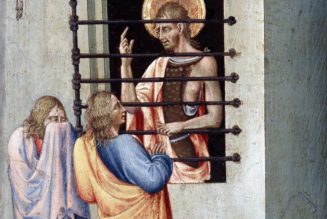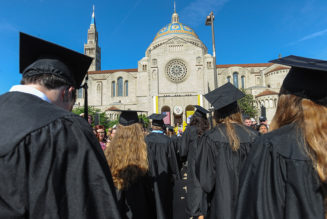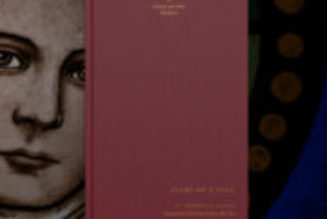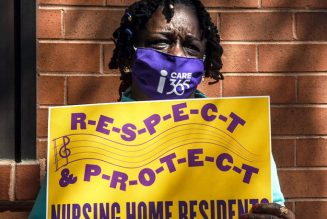 |
We’re all hoping that life will return to “normal” in a few weeks, at least to some extent. We’re also hearing (often from the same source) that life will never be the same because of COVID-19. Obviously, we all want certain things to return to normal as soon as possible. We want to receive the sacraments and go back to work. We also want an end to (or at least a lessening of) the social distancing measures. Yet some things should never return to normal. God has embedded some important lessons that we need to learn from this experience, and which we would be wise to retain.
The most evident is how innovative clergy and ministry leaders have become in helping people stay connected to their parish and our mission as Christ’s own Body. We’ve seen a revolution in the use of social media, for example—or at least it has been a revolution for Catholic parishes. Beyond the live-streamed daily events and the push for online giving, we’ve seen people gathering over Zoom for Bible study, or to pray the rosary together. We’ve seen a proliferation of guides to at-home activities parents can do with their children, now that they’re actually able to spend time with each other. While some souls will sadly fall away now that their Sunday Mass routine has been broken, I for one have seen various members of Christ’s body being awakened out of their spiritual atrophy.
What makes this use of media technology different is that we are not using it as a stand-in for church life. It’s not a mere prop for looking like we know how to keep pace with the culture. Having a Facebook page or a nice website is not “community building” or mission-oriented on its own. We have utilized these tools for some time now, but the present circumstances are forcing us to use them for the sake of mission and community life. In addition to praying and even worshiping God more regularly, we need to be together during the week and reach out to people at a distance, instead of just advertising the fish fry.
Thus, we are using media to build up church life and be engaged with each other and the wider community. For example, in my parish a woman has worked to coordinate volunteers who are reaching out to everyone on the registry to see if our parishioners are doing okay and if they have any needs that others in the parish can handle. This is all being done via email and Google Docs. I wonder why it takes a crisis to pull something like that off. Shouldn’t we always be that intent on connecting with people “socially distanced” from parish life?
Here’s another amazing development: people have been organizing food distribution and an errand-running ministry for those unable to go out. Again, is there a reason we haven’t always been doing this? The effort has been so concerted precisely because of a palpable sense of urgency to help those unable to make it through this pandemic. Yet we know there are always people in our community who are alienated and not managing well on their own. More people seem concerned for the vulnerable these days, and that’s a great thing for disciples of Jesus. Let’s not go back to “normal.”
The coronavirus pandemic is an opportune moment for the Church to rediscover herself as the Body of Christ. We have needed for some time to break out of our bourgeois comforts and complacency and be church to each other and to those standing at a distance from us. “Church” is wonderful, but only insofar as it is in service to what is essential to our mission as a community of faith entrusted with the Gospel and the salvation of souls.
Some Catholics have criticized the bishops’ decision to suspend public Masses; certainly, none of us want to go a whole week without presenting ourselves at the Holy Sacrifice. Yet social distancing has forced us to reflect on how we are connected as a people—as God’s people—and, more importantly, how God’s people are called to mission to those outside the Church.
Here are a few other innovations. Many parishes wrestle with potential scruples surrounding reception of the Eucharist. Is it okay not to receive each week? Is it okay to stay home if I’m not feeling well? The answer to both questions is, Yes, absolutely. Sickness is communicable even at Mass, folks. All the faith in the world will not necessarily protect a person from contracting an illness. That’s why the Church has long dispensed the ill and sickly from their Sunday obligation. I suspect that, when public services resume, we’ll all be more prudent in deciding when to stay home—especially when it comes to safeguarding the more vulnerable members of our communities.
Another keeper is the concerted effort to pray for healthcare workers, the sick, and others on the front lines of our nation’s response to COVID-19. Hopefully, we always pray for these people, but surely we’ve all noticed an increased fervor of late. A constant stream of reports on jam-packed emergency rooms and doctors working 24-hour shifts forces us to imagine ourselves in their shoes. We can’t help but marvel at what they must be undergoing, especially in epicenters like New York City and Detroit. Regardless of the protective gear (when they have it), they are still placing themselves at risk. We can be inspired by their courage, and not be so afraid ourselves.
Most of all, however, the thing I really hope that doesn’t return to normal is the slower pace of life and the time at home with family. Especially in America, we’re just too busy to enjoy the simple pleasures of life that more leisure affords. Every day I’ve seen my children walk our dog together, and that’s a big deal. We’ve been able to eat dinner together and say family prayers afterwards every day because we have had no sports during our dinner hour. Dinner hour? What a rediscovery!
I fear that these moments will vanish quickly when life returns to normal. But they shouldn’t. Despite the anxiety and stifling isolation, hopefully we’ve all been touched by something a little deeper and more sublime these past weeks. God has given us time as a gift, and we receive it with a more solemn recollection of the little things that make life worth living: an intentional faith community, human solidarity, family meals, and many other ordinary blessings besides.

Dr. Therrien’s book The Catholic
Faith Explained is available now
from Sophia Institute Press.
Image: Volunteers affix pictures sent in by parishioners so that they can “be there” for the live stream of Easter Sunday Mass at Our Lady of Sorrows Catholic Church in South Orange, New Jersey on April 11, 2020. (Getty Images)







